Milton Sims "Mickey" Newbury Jr. was an American singer-songwriter and a member of the Nashville Songwriters Hall of Fame.

Roy Orbison Sings Don Gibson is a tribute album recorded by Roy Orbison for MGM Records. Released in January 1967, it is a collection of songs written by Country Music Hall of Fame singer/songwriter Don Gibson who, like Orbison, often wrote about the loneliness and sorrow that love can bring. Its one single, "Too Soon to Know", became a smash hit in the UK, reaching #3 there in September 1966, and also reached no. 4 in Ireland and no. 27 in Australia. In Canada, the song only reached no. 71.

The Great Songs of Roy Orbison is an album recorded by Roy Orbison for MGM Records released in the United States in February 1970.
Dan Folger was an American singer and songwriter.
"Just Dropped In (To See What Condition My Condition Was In)" is a psychedelic rock song written by Mickey Newbury and best known from a version by the First Edition, recorded in 1967 and released to popular success in 1968. Said to reflect the LSD experience, the song was intended to be a warning about the dangers of using the drug.

Leather and Lace is a duet album by Waylon Jennings and Jessi Colter, released on RCA Records in 1981.
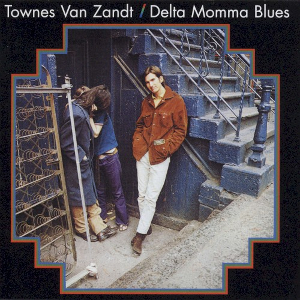
Delta Momma Blues is the fourth studio album by the country singer/songwriter Townes Van Zandt, released in 1971. Unlike his previous albums, which were influenced by Appalachian folk and country music and recorded in Nashville, this album was blues influenced and recorded in New York City.

At My Window is the eighth studio album released by folk/country singer-songwriter Townes Van Zandt in 1987. This was Van Zandt's first studio album in the nine years that followed 1978's Flyin' Shoes, and his only studio album recorded in the 1980s.
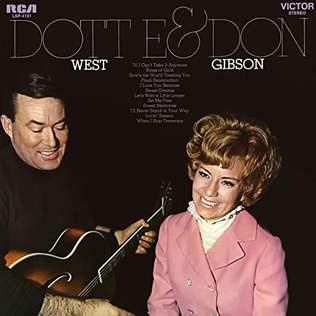
Dottie and Don is a studio album by American country music artists Don Gibson and Dottie West. It was released in March 1969 on RCA Victor Records and was produced by Chet Atkins and Danny Davis. The album was a collection of duet recordings between Gibson and West. It was both artists first album of duets to be recorded. Among the songs from the project, "Rings of Gold" became a major hit in 1969.
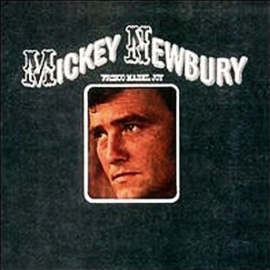
'Frisco Mabel Joy is a 1971 studio album by singer-songwriter Mickey Newbury. This was the second of three albums Newbury recorded at Cinderella Sound. The album includes the original version of "An American Trilogy", which Elvis Presley later performed in his Las Vegas shows with much success. "How Many Times " is a dramatically re-imagined version of a song first released on Harlequin Melodies, Newbury's RCA debut. Other standout tracks include "The Future's Not What It Used to Be", "Remember the Good", "Frisco Depot", and "How I Love Them Old Songs". The track "San Francisco Mabel Joy" was not initially part of the album, though it is included on some versions. ’Frisco Mabel Joy was collected for CD issue on the eight-disc Mickey Newbury Collection from Mountain Retreat, Newbury's own label in the mid-1990s, along with nine other Newbury albums from 1969 to 1981. In 2011, it was reissued again, both separately and as part of the four-disc Mickey Newbury box set An American Trilogy, alongside two other albums recorded at Cinderella Sound, Looks Like Rain and Heaven Help the Child. This release marks the first time that 'Frisco Mabel Joy has been released on CD in remastered form, after the original master tapes were rediscovered in 2010.

Rhinestone Cowboy Live, on the Air & in the Studio is made up of songs performed on the TV show Melody Ranch around 1967, tracks from My Hits and Love Songs (1999) plus some previously unreleased tracks on the first disc, a selection of songs from Glen Campbell Live (1981) on the second, and a complete reissue of Glen Campbell Live! His Greatest Hits (1994) on the third disc.
"Mister Can't You See" is a song written by Mickey Newbury and Townes Van Zandt that first appeared on Newbury's 1968 debut album Harlequin Melodies. Newbury's original version was slow and dominated by strings and a very simple drumbeat, with his voice telling a tale of nature's power and beauty. The actual title of the song comes from the line "can't you see the river flowing".

Good Times is the eighth studio album by American country music singer Willie Nelson, released in 1968. Arrangements were by Anita Kerr, Bill Walker and Ray Stevens.

"(I'd Be) A Legend in My Time" is a song written and recorded by Don Gibson in 1960. It appeared as the B-side of his hit "Far Far Away", from the album Sweet Dreams. Gibson re-recorded the song on the 1972 album Country Green.

Looks Like Rain is a 1969 concept album by singer-songwriter Mickey Newbury. After recording his debut album with RCA, Newbury was dissatisfied with the resulting album and left RCA to pursue a style closer to his tastes. Recorded at Cinderella Sound, as his next two albums would be, the result is widely considered his first real recording and represents a peak in the singer songwriter movement, especially for Nashville. The sound and style of the record would be highly influential during the Outlaw Movement during country music in the 1970s especially on albums by David Allan Coe and Waylon Jennings. Linking the tracks with delicate arrangements and liberal amount of atmosphere, the record contains some of Newbury's most celebrated compositions including "She Even Woke Me Up to Say Goodbye", "33rd of August", "I Don't Think Much About Her No More", and "San Francisco Mabel Joy". AllMusic's review of the album concludes, "Looks Like Rain is so fine, so mysterious in its pace, dimension, quark strangeness and charm, it defies any attempt at strict categorization or criticism; a rare work of genius."
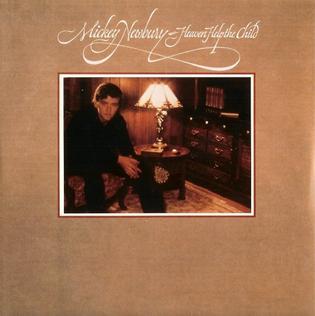
Heaven Help the Child is a 1973 studio album by country singer-songwriter Mickey Newbury. The album was Newbury's third consecutive release recorded at Cinderella Studios. Noted for its dramatic remakes of four previous Newbury songs: "Sweet Memories" and "Good Morning Dear" from Harlequin Melodies, "Sunshine" from Sings His Own, and "San Francisco Mabel Joy" from Looks Like Rain, the album is considered equal among Newbury's acclaimed Looks Like Rain and Frisco Mabel Joy. Apart from its definitive versions of three of Newbury's early songwriting hits, the album is also acclaimed for its title track, with its multi-generational narrative, the haunting "Cortelia Clark", and the bluegrass classic "Why You Been Gone So Long". In his AllMusic review of the LP, Thom Jurek declares, "Newbury, for the third time in as many recording sessions, came up with a record that defies categorization. And for the third time in a row, he had done the impossible, created a masterpiece, a work of perfection."

The Mickey Newbury Collection collects the ten albums Mickey Newbury released on three labels between 1969 and 1981 on an eight disc set. The set was released and is available through Mountain Retreat, a label run by Newbury and later Newbury's family. While Newbury had an impressive reputation as an artist and songwriter, at the time of the set's release in 1998, these recordings had been out of print for years. The original master tapes were lost by the labels, and so the recordings on the collection are digital transfers from virgin vinyl copies. The packaging replicates the original album art.

Rusty Tracks is a 1977 album by singer-songwriter Mickey Newbury, released by Hickory Records. The record is noted for Newbury's interpretations of four traditional songs, "Shenandoah", "That Lucky Old Sun", "Danny Boy", and "In The Pines".
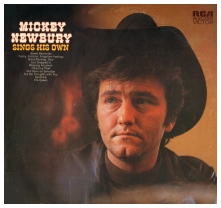
Sings His Own is the 1972 compilation album by singer-songwriter Mickey Newbury, a revised edition of his debut Harlequin Melodies, released by RCA Records in 1972, after the critical notice of Newbury's highly acclaimed Looks Like Rain and Frisco Mabel Joy. Newbury's RCA debut heavily featured songs that had been made into hits by other artists, and there is not much difference between that set and this one. Newbury largely disowned his RCA recordings, considering 1969's Looks Like Rain his true debut, and this album bears little stylistic similarity to anything else in his catalog.
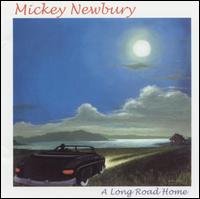
A Long Road Home is the 2002 concept album by singer-songwriter Mickey Newbury, released on his Mountain Retreat label. The album was recorded while Newbury was receiving full-time oxygen treatments for emphysema. The concept album is notable for its two ten-minute plus songs "In '59" and "A Long Road Home," new songs "Where Are You Darlin' Tonight" and "So Sad," and a new version of "Here Comes The Rain, Baby" one of Newbury's early songwriting successes that he first recorded for his debut Harlequin Melodies. This was the last studio album Newbury released in his lifetime.
















